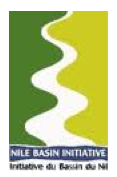The Nile Basin Initiative (NBI) released the "State of the Nile River Basin Report 2012" to guide policy making within the Nile River basin.
The report covers issues including ecosystems and biodiversity, hydropower, navigation, climate change and agriculture.
The report identifies challenges such as increased pressure on environmental resources, water scarcity and increasing population.
 15 October 2012: The Nile Basin Initiative (NBI) published the “State of the Nile River Basin Report 2012,” which highlights the fragile aquatic ecosystems of the Basin. The report notes the importance of the Nile for migratory birds and describes issues related to agricultural water use, power generation, navigation and climate change impacts on the basin.
15 October 2012: The Nile Basin Initiative (NBI) published the “State of the Nile River Basin Report 2012,” which highlights the fragile aquatic ecosystems of the Basin. The report notes the importance of the Nile for migratory birds and describes issues related to agricultural water use, power generation, navigation and climate change impacts on the basin.
The report is the first in a series, to be published every three years, to provide accurate and reliable information on aspects of the Nile River basin. Aimed at policy makers, the report will provide information for informed management of and policy decisions regarding the Nile River basin.
Among key facts identified by the report are that: water demand within the basin is increasing; environmental resources contribute 60% of basin state gross domestic production (GDP); deforestation reduced forest cover by 18% between 2005 to 2009; population will increase by 52% by 2030; hydropower potential of the basin is only 26% developed; and climate change is expected to increase temporal variability of water increasing both drought and flood risk.
The report contains chapters on: water resources of the Nile Basin; environmental resources of the Nile Basin; opportunities and challenges of the growing Nile population; agriculture, food security, and livelihoods in the Nile basin; hydropower potential and the region’s rising energy demand; role of inland water transport in support of further regional integration; and climate change and its implications for the Nile region. The report highlights as challenges: water scarcity; pressure on environmental resources, including wetlands; increasing population; food security; meeting regional energy needs; and climate change.
The Nile Basin Initiative is an intergovernmental process founded in 1999 to promote peaceful socioeconomic development of the Nile River basin by Burundi, the Democratic Republic of Congo, Egypt, Ethiopia, Kenya, Rwanda, South Sudan, Sudan, Tanzania and Uganda. [Publication: The State of the Nile River Basin 2012 Summary] [Publication: The State of the Nile River Basin 2012 Key Messages] [Publication: The State of the Nile River Basin 2012 Introduction] [Publication: The State of the Nile River Basin 2012 Forward and Table of Contents] [Publication: The State of the Nile River Basin 2012 Key State of the Nation Indicators] [NBI Press Release]